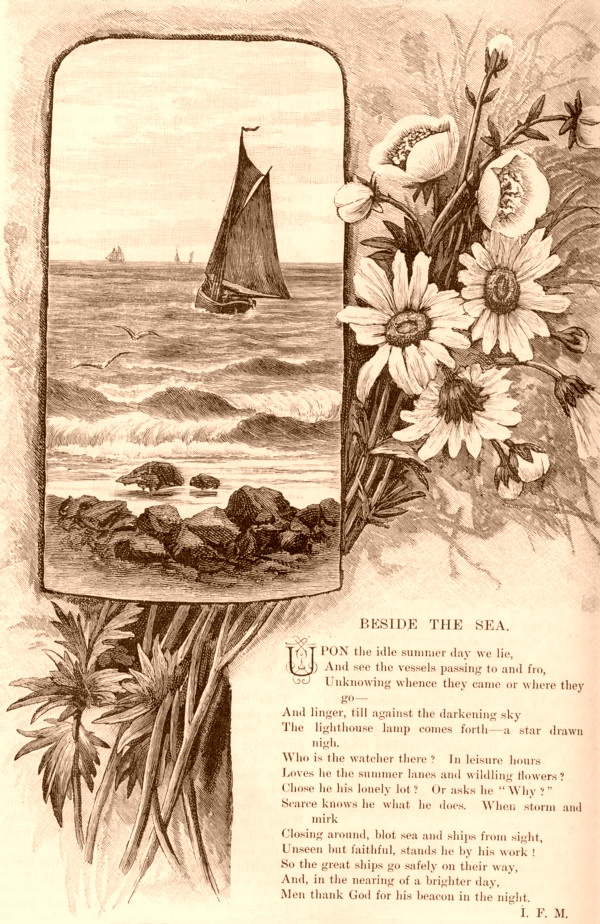
From The Quiver, 1885.
――――♦――――
|
Poems
by
Isabella Fyvie Mayo
collected from magazines of the period.
___________
|
|
1.
A MESSAGE FROM THE SEA. |
|
2. THE
MIDNIGHT LAMP. |
|
3. MY
COUSIN'S PORTRAIT. |
|
4. THE
DEATH OF EMILIA MANIN. |
|
5. MET
AGAIN. |
|
6. THE
PRISONER. |
|
7. THE
DEAD POET. |
|
8. BESIDE THE
STILE. |
|
9. IN THE
CHOIR. |
|
10. WAITING IN
THE DUSK. |
|
11. FAMILY
MUSIC. |
|
12. "BROKEN
OFF." |
|
13. AMONG THE
CORN. |
|
14. THE DEAF
MUSICIAN. |
|
15. EASTER. |
|
16. A LOVE-GIFT. |
|
17. FATHER AND
MOTHER. |
|
18. TIMES OF
REVEALING. |
|
19. GOOD-BYE! |
|
20. IN THE
FIRELIGHT. |
|
21. A MESSENGER
OF CONSOLATION. |
|
22. A PERFECT
DAY |
|
23. SHADOWS
OF THE PAST |
|
24. A CRIPPLE'S
STORY |
|
――――♦――――
|
|
A MESSAGE FROM THE SEA. |
|
THE stormy
afternoon was past,
And in the dim grey sky,
Between great hoary clouds, the sun
Looked out with lurid eye:
And we, two strangers from the town, the sea breeze yearning for,
Walked down between the fishers' cots, and went toward the shore.
The beach was still enough, but yet
The tempest left its track,
And almost fearfully we passed
Torn nets and heaps of wrack:
There is a mystic mockery about the wind and storm,
They make such rude and simple things so like a human form!
My sister's face was strangely pale,
A thrill was in her tone,
Her brown eyes looked like those who watch
To have some mystery shown:
I only thought, "Hope wears the heart,—ay, even more than Fear,
And Bessie waits for one she loves,—I would that he were here!"
The lurid sun sank in the sea,
But left a glare behind;
And the slow tide those treasures left
Which loiterers love to find;
My sister turned aside to pick what seemed a glittering shell;
And from some church I could not see, there tolled a solemn knell.
I turned and saw that Bessie knelt
Upon the crunching sand;
"O God, Thy help! " she said, and kissed
That something in her hand,
And then she held it out to me—a grievous sight to bear—
A locket I had seen before, filled with her own bright hair.
The waves had left it at her feet,
To bid her hope no more;
He whom she waited, watched for her
Upon a calmer shore:
And very soon she went to him: our youngest and our best
Sleeps sweetly by the moaning sea, with its message on her breast.
I. F.
From The Quiver, Vol. II., 1867.
――――♦――――
|
|
THE MIDNIGHT LAMP. |
|
FROM window,
curtainless and high,
There gleamed a sickly, yellow light;
On other casements darkness fell,
But that shone all the dreary night.
And every morning, when the street
Woke to the carman's cheery shout,
Or the quick tread of hurrying feet,
The little yellow light went out.
Beside it sat a haggard man,
Yet 'twas not time had made him so;
Rather, each year that o'er him ran
Had left him a decade of woe.
He lived a month in every night—
A month of anguish and despair;
Whilst something on his brow did write
A look that youth should never wear.
He often left the dismal house,
And walked away, with downcast eyes,
As though he feared to see a curse
Writ on the sunny summer skies.
Yet, stern and grave as he appeared,
The little children in the street
Smiled in his face, and never feared
To sport and gambol at his feet.
Yet when those cherub looks were raised,
Half shyly, flashing fun and play,
Scarcely upon their smiles he gazed,
But sighed, and turned his face away;
As though he feared lest childhood's eye
Should chance to penetrate the veil
Of a dark story, and descry
The dismal secret of his tale.
But on one gusty winter eve,
When wind was high, and snow was deep,
Just such a night as makes one grieve
For those who have no home to keep—
I drew aside my curtain's fold,
Half shuddering in the frosty air,
The stars were shining, clear and cold,
But that dim lamp—it was not there;
And fears within my spirit stirred,
I felt my brow grow cold and white,
As though a ghostly voice I heard
Upon the silence of the night.
I sought my bed—sleep closed mine eyes—
I woke in fear—my brow was damp—
I know not what I dreamed, but I
Had dreamed about that little lamp!
I rose, and from my window saw
The house of that mysterious light,
Dull was the morning, dim and raw,
Soiling the snow so pure last night.
People were gathered in the street,
In hushed, mysterious tones they spoke;
Then watchmen came, with heavy feet,
And, passing swiftly mid the folk,
Entered the house, and in its gloom
They found they needs must have a light.
I saw them pass from room to room
To that which once was lit by night,
And long and long they lingered there
(But what they found I could not say);
Then out they came with looks of care,
And sent the people all away.
What had they found?—they found him dead,
That lonely watcher in the night,
Lying alone upon his bed,
And near him his extinguished light.
But though his face was dark and lean,
It wore no more its look of care,
A smile was o'er its sorrow seen,
The cold hand held a lock of hair—
A single lock of golden hair
Long, silken, curled, as women's are;
Its owner—was she false as fair?
Or was she dead, or gone afar?
We can but guess that shining tress
Was some sweet relic of his past—
A comfort or a bitterness
That soothed, or stung him to the last.
And that was all that man could learn,
But yet it gave me sudden pain
To know that lamp would never burn
On that high window-sill again;
And from my memory ne'er will go
The tarnished hearse, the rusty pall,
The gaping crowd, and all the woe
Of that unfollowed funeral.
I. FYVIE.
From The Quiver, Vol. II., 1867.
――――♦――――
|
|
MY COUSIN'S PORTRAIT. |
|
JUST where the
early sunbeams fall,
And waken me at dawn,
To hear the lark sing praise because
Another day is born,
There hangs a little portrait, and none know how 'tis stored,—
I simply tell my guests it is "my cousin, gone abroad."
He lived upon the breezy hills,
And I in London town;
My face was fair, and thin and pale,
And his was fresh and brown,
But oh! what happy times we had, when we were girl and boy,
And had not got a ghost of care to haunt us in our joy!
My earliest thoughts of him are linked
With pleasant flowers and trees,
With gloveless hands, and locks unbound
And freshened in the breeze.
And often since in country towns, I've felt mine eyes grow dim,
Because each homely sight and sound brought memories of him.
When last I saw his country home,
Its hearth was desolate;
And the last country walk we took
Led through the churchyard gate:
And as we faced the sunset there—the new-made grave was nigh—
I knew in all the wide green earth his nearest friend was I.
When next we met, we met to part,
Upon the crowded pier;
And through the drizzling mist I saw
The gaunt, black shipping near:
And as he kissed my tear-stained cheek in all the wind and rain,
I could not—did not—dare to hope I'd see his face again.
Yet keenest sorrows very soon
To happiest memories turn;
As sweetest smiles break calmly forth
From lips we fancy stern;
For then how bitterly I wept, to think that he must roam,
And now I'm almost glad he went, for now he's coming home!
ISABELLA FYVIE.
From The Quiver, Vol. II., 1867.
――――♦――――
|
|
THE DEATH OF EMILIA MANIN.
[EMILIA MANIN
was the only daughter of Daniel Manin, Dictator of the Venetian
Republic of '49. Emilia, her mother, and brother went with him
into exile in the autumn of that fatal year. Madame Manin died at
Marseilles; Daniel and his children settled in obscurity in Paris.
Emilia had long endured a terrible and mortal malady, but her
martyrdom did not close until the beginning of '54. Then,
sighing, "Venice, I shall never see thee more!" she went to her
rest. Her remains were buried in the tomb of the artist, Ary
Scheffer.]
|
|
FALLS the
sunlight, dim and faint,
On her face, like face of saint,
On her thin, white hand:
Oh, the patient spirit pines
For the brighter sun which shines
In a brighter land!
Down her wan cheeks never steal
Quiet tears, which sweetly heal
The unspoken woe:
For although they often rise
Like a mist before her eyes,
Yet they do not flow.
That which sacrifice doth ask,
That which gives a noble task,
Soon our love obtains.
And when one hath given all
At a martyred country's call,
What a love it gains!
She has given youth and health,
And her father's modest wealth,
And her mother's smile:
Gazing at the fresh blue skies,
Mute upon her couch she lies,
All the weary while.
Has her father toiled for nought?
Have his comrades sternly fought
Only for a grave?
Fettered must their country weep,
Those who on her bosom sleep,
Beautiful and brave?
Shall it never rise again,
Better for its martyr's pain,
That dear sunny land?
Ah! she sends the thought away,—
She can love, and she can pray,
But not understand.
So the fair brow fadeth fast,
It is very near the last,
And 'tis growing late:
See, the sunbeams fade away,
They will come another day,
But she cannot wait!
Falls the starlight, dim and faint,
On her face, like face of saint,
On her thin white hand:
And no more her spirit pines
For the brighter sun which shines
In the Brighter Land.
ISABELLA FYVIE.
From The Quiver, Vol. II., 1867.
――――♦――――
|
|
MET AGAIN. |
|
ALAS ! when after
years apart,
When every thought of wrong and strife,
And every stinging of the heart—
With which lost love is often rife—
Have passed away, and nought remains
To tell the love was ever there;
Except some faint accusing pains,
A whisper in the evening prayer,
A little talk between the lights
With some one both have known of old;
Or spectral thoughts on Christmas nights
Of blanks within the household fold;
Until a day when, as we tread
Some dismal, crowded city lane,
The shadowy past gives up its dead,
And shows the missing one again!
And by the unconscious lip and eyes,
In spite of all our flatterers say,
We learn that what he used to prize,
Has faded from our face away:
And that the memory he bears
Is different and fairer far,
Unshaded by the griefs and cares,
Which slowly made us what we are!
And then we feel that not alone
The bitter changes on our brow:
Our very lives have different grown,
We might have little mutual now!
No history that we could tell
Could span the years since last we met;
Or break away each secret spell,
Whose seal upon the soul is set.
Oh! not for friends who wait above,
But for the living friends apart,
We feel the still despair of love,
The hopeless blank within the heart!
Because the lives that parted so,
The hearts that thus were rent in twain,
Can never in one channel flow,
Can never more be joined again!
I. FYVIE.
From The Quiver, Vol. II., 1867.
――――♦――――
|
|
THE PRISONER. |
|
SINCE I walked
careless in the noisy street,
With common words for any I might meet,
And did the petty duties each day brought,
And grievous troubles from small sources wrought,
Ah, me! it seems a weary while ago.
'Tis dreary desolation here to wait
The dreadful hour when I shall meet my fate!
Whilst others all the sweet of living share,
Nor of the hapless captive think or care.
Yet once it bore as little on my mind,
When other men in other prisons pined.
I too in heedless, over-hasty blame,
Forgot the human heart beat on the same;
Forgot the subtle agony which wrings
A wounded soul, remembering common things
As when the sunlight on this prison floor
Recalls some scene that I shall see no more!
Perchance some gentle hearts may grant my pain
The justice they would hope themselves to gain;
Nor blindly every accusation trust,
When he, who only can refute, is dust.
And in the end, most lives appeal above;
Some cry for "Rest," and others wait for "Love:"
For "Justice" to the one just Judge I call!—
And Heaven provides a recompense for all.
Yet still, 'tis very hard to die like this!
No household hearth my presence there to miss;
Nothing to leave, except this dismal cell,
No loving lip to press a last farewell!
But through the tumult of a rabble rout,
Mid grave hard faces, full of stinging doubt,
Forlornly lone, this hunted soul must go,
And bear to heaven few memories but woe!
And yet I could not join the world again;
My heart has withered in this bitter pain.
Wounded by finding mortal Justice blind,
I've almost lost my faith in human kind.
'Tis best to bow beneath man's erring rod,
And ask no more for justice—save from God!
I.F.
From The Quiver, Vol. II., 1867.
――――♦――――
|
|
THE DEAD POET. |
|
DRAW back the
curtain, let the light
Upon the chamber's gloom,
That I may think my son asleep,
Not ready for the tomb!
Ah! what he was, he always looked, but ne'er so fair as now;
The angels' wakening kiss has left a glory on his brow!
"He will be great, God make him good,"
His father used to say;
For while we watched him at our side,
A little child at play,
There was an awed look on his face, I knew that it must be,
Sweet voices whispered to his soul, which never spoke to me!
But as we marked the first faint light
Of slowly-dawning fame,
We knew that it would only serve
To gild a dead man's name!
And we, his parents, with no gift but what in loving lies,
Stood lonely on the silent earth, and watched him win the skies!
O God! why was it thy great will
To take him home so soon,
While other livies are spared to reach
A dull inglorious noon?
But in our hearts a voice replies, "What! would you have him miss
An hour of Joy in that blest world, for years of fame in this?"
"For our sake, Lord, not his," we plead,
"He, drew us, nearer thee.
This dark world needs the Heav'n-sent light
That shines in such as he."
But yet again the voice replies, "Light reacheth from afar:
I took your gem, and purged its dross, and now it lives a star!"
And so we drop Fame's half-wove wreath,
He does not need it there;
For he has won a brighter crown
Than poets ever wear!
And we will not cross God's good will by one unworthy sigh,
Though now our world's a wintry scene beneath a sunny sky.
ISABELLA FYVIE.
From The Quiver, Vol. II., 1867.
――――♦――――
|

|
BESIDE THE STILE. |
|
WE both walked
slowly o'er the yellow grass,
Beneath the sunset sky:
And then he climbed the stile I did not pass,
And there we said Good-bye.
He paused one moment, I leaned on the stile,
And faced the hazy lane:
But neither of us spoke until we both
Just said Good-bye again.
And I went homeward to our quaint old farm,
And he went on his way:
And he has never crossed that field again,
From that time to this day.
I wonder if he ever gives a thought
To what he left behind:—
As I start sometimes, dreaming that I hear
A footstep in the wind.
If he had said but one regretful word,
Or I had shed a tear,
He would not go alone about the world,
Nor I sit lonely here.
Alas! our hearts were full of angry pride,
And love was choked in strife:
And so the stile, beyond the yellow grass,
Stands straight across our life.
ISABELLA FYVIE
From Good Words, 1867.
――――♦――――
|

|
IN THE CHOIR. |
|
ON rolled the
mighty melody,
As though multitude passed by—
A sea of sound and sweetness; here and there
A clear young voice pealed high:
A glory crept along the vaulted roof,
And tinged the old grey stone:
The sunshine stole it from the windows where
The saints each stood alone.
Below knelt youth and beauty in their pride,
Fair as the flowers of June.—
How did that psalm of strife and agony
Chime with each young heart's tune!
And then the heavy oaken door swung back:
A woman entered in—
Wan in the face, and weary in her mien,
Her garments soiled and thin;
And like a blot upon a robe, she stood
Amid the gorgeous fane;
And youth and beauty drew themselves apart,
And she went out again.
Still, where the pictured Twelve Apostles stood
The light came coloured fair;
But yet methought those men of Galilee
Had scarce been welcome there!
ISABELLA FYVIE.
From Good Words, 1867.
――――♦――――
|

|
WAITING IN THE DUSK. |
|
SITTING alone in
the twilight time,—
Alas! how silent the old house seems—
Kissing the voices that only chime
In waking fancies or sleeping dreams!
I sit in my mother's old arm-chair,
But where are the others? Ah where? ah where?
Where is our Willie, so grave and wise?
And where is Harry, so true and bold?
Where is Mabel with laughing eyes,
And tresses sprinkled with molten gold?
On Willie's tombstone the moss is gray,
And Harry is sleeping in Biscay Bay.
But Mabel? Mabel may come again:
Her name is still in my daily prayer;
Yet when I stand where our dead are lain,
I'd rather that it were written there.
They heard God call them, and they obeyed;
But Earth called Mabel—and Mabel strayed.
Yet while God spares, it is not too late
To turn away from the Tempter's smile;
And so in the lonely house I wait,
Because I expect her all the while:
If strangers mot her the day she came,
She might go back to her sin and shame.
I can see the city lie far away,
A sloping path from our house leads down;
And surely, surely, some summer day,
A fading woman will leave the town,
And climb the hill, and traverse the moor,
And enter in at my open door.
ISABELLA FYVIE.
From Good Words, 1867.
――――♦――――
|
|
FAMILY MUSIC. |
|
BESIDE the window
I sit alone,
And I watch as the stars come out,
I catch the sweetness of Lucy's tone,
And the mirth of the chorus' shout:
I listen and look on the solemn night,
Whilst they stand singing beneath the light.
Lucy looks just like an early rose
(Somebody else is thinking so),
And every day more fair she grows
(Somebody will not say me no),
And she sings like a bird whose heart is bless'd
(And Somebody thinks of building a nest!)
And now she chooses another tune,
One that was often sung by me:—
I do not think that these nights in June
Are half so fine as they used to be,
Or 'tis colder watching the solemn night,
Than standing singing beneath the light.
Lucy, you sing like a silver bell,
Your face is fresh as a morning flower—
Why should you think of the sobs which swell
When leaves fall fast in the autumn bower?
Rather gather your buds and sing your song,
Their perfume and echo will linger long.
I'm grey and grave,—and 'tis quite time too,—
I go at leisure along my ways;
But I know how life appears to you,
I know the words that Somebody says:
As old songs are sweet, and old words true,
So there's one old story that's always new!
There is a grave that you do not know,
A drawer in my desk that you've never seen,
A page in my life that I never show,
A love in my heart that is always green:
Sing out the old song! I fear not the pain,
I sang it once—Lucy, sing it again!
ISABELLA FYVIE.
From Good Words, 1867.
――――♦――――
|
|
"BROKEN OFF." |
|
THE sun flares
out in the ruddy east,
The ships stand rigid, like ghostly trees:
The roar and rattle of work have ceased,
The bathers' laugh comes up on the breeze,
And in the flash of the sunset gold
I count the chests I have bought and sold.
I am not old; yet my hair turns white,
My face is growing too wise and keen:
I hunt for money with all my might—
But God best knows what I might have been
If one, now wearing a poet's bays,
Had kept the troth of her girlish days!
I praised her songs when none else would heed,
Yet not for her songs I loved her so:—
O God! has a woman's heart no need
For quiet shelter from Fame's dread glow?
Surely her genius had lost no light
If she had kept to her early plight!
I gave my best, and she threw it down:
I never can be my best again;
But I just live on in the noisy town,
—One grows accustomed to any pain—
And in the flush of the evening gold,
I count the chests I have bought and sold.
Oh, surely a soul to whom God gives
A sight of the angels' singing-book,
Should grow so pure in the life it lives
As not to blush at an angel's look.
But still she blushes when I go by,
And yet no angel at all am I!
ISABELLA FYVIE.
From Good Words, 1868.
――――♦――――
|

|
AMONG THE CORN. |
|
THE girl sat down
'mid the rustling corn,
And startled a nested bird,
And up it sprang with a burst of song;
But I do not think she heard.
She sat her down on the low stone wall,
And gazed at the sunset sky:
I cannot think that she saw its glow,
For why should it make her sigh?
What does she think about, sitting there?
What does her spirit see?
Is she thanking God for His golden sky,
And for river and hill and tree?
No: for her heart's in the city streets
Where the working day is done:
The crows are hurrying home, she knows
But she only thinks of one.
She sees a room in an old brown house,
With a window long and low,
Where above the hum and the dusty moil
Some country geraniums grow.
She dreams of the life the women have
Who live in such homely place:
Is it the light of the setting sun
That is glowing on her face?
What of the meadows that smile below,
Or the ruddy clouds above?
They are but the gold God gave to set
Round His priceless gem of love.
Let her sit and dream 'mid the rustling corn
Till the golden sky grow grey:
We scarcely notice God's earth is fair
Till something is gone away.
ISABELLA FYVIE.
From Good Words, 1868.
――――♦――――
|

|
THE DEAF MUSICIAN. |
|
SEE a lark in the
far summer sky,
My darling seated at her harp I see,
Playing the while our little children sing:
The world is full of music—not for me!
I dreamed last night of some dim abbey choir:
The lights were burning where the singers stood
Chanting my anthem. I crouched in the dark,
Weeping for joy to hear they called it good!
O music of my sleep, that mocks my soul
With cruel joys that are fulfilled no more
Than his who dreams of light and love at home,
And wakes to find himself on Arctic shore!
It haunts me always through my silent days,
With life before me like a closed gate.
—If God had only bidden me to die;
—Or anything but this hard work—to wait.
To wait and work, and know my work but as
Some poor fond mother from her infant reft,
Shuts the sweet memory safe from change and time,
And dreams to find her boy the babe she left!
And yet there is a thought will sometimes creep—
It even mingled in my dream last night—
I'd rather make my music in the dark,
Than only stand and sing it in the light!
Maybe the dream is nearer truth than sound,
And could I hear my tune, mine eyes might miss
Some of the sweetness soaring in my soul:
Better go wanting that, and having this!
And there are songs in heaven. God forgive
A poor deaf man for wondering what they are.
Perchance it is their echo that I catch,
And I shall hear those same songs sweeter far!
ISABELLA FYVIE MAYO.
From Good Words, 1875.
――――♦――――
|
|
EASTER. |
|
OUR graves lie
closed this Easter day,
But from their rugged sod
The sweet spring grass comes softly up
With messages from God.
"But ah!" men wail, in dreary doubt,
"In autumn this will die;
All nature has no type to tell
Of immortality!"
Peace! she has types for ever fresh,
For griefs for ever new.
A type which lived from age to age,
Could be no type for you.
And, haply, in this rise and fall,
Which still in beauty grow,
There lurks a truth that men may guess,
And endless life may show.
We do not fear when winter comes,
We know the spring will wake;
We gladly rest when night draws on,
We know the dawn will break.
And what if in those cycles vast,
Whose limits none may scan,
Even death may hold a happy place,
Part of the life of man?
And still, as we sit sad and lone,
In Time's too narrow prison,
The angels' song goes ringing on,
Which says that Christ is risen.
Dumb mother nature makes her signs,
But from our Father's love
Comes forth the word of Him who died,
And lives again above.
ISABELLA F. MAYO.
From The Quiver, 1879.
――――♦――――
|
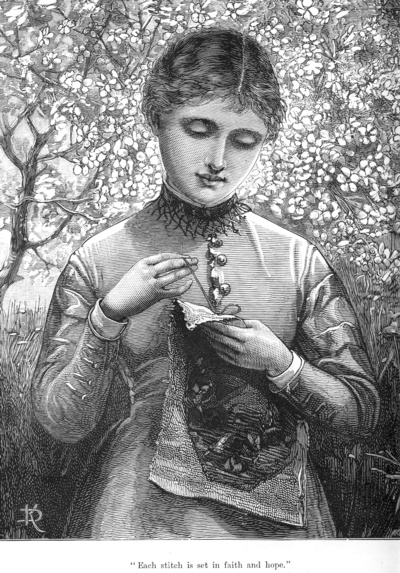
|
A LOVE-GIFT. |
|
HE whom she loves
is far away
From her and summer trees;
Daily he toils by dying beds,
Whose woe God only sees.
She cannot share his holy task,
She sits at home and prays,
To sends her dainty handicraft
To cheer his dreary ways.
Each stitch is set in faith and hope;
He feels their mystic spell:
And how they aid his skill and strength
He knows, but cannot tell.
Not all of us may bear the gloom
Where sins and sorrows blend,
But those who do may feel our love
On all their steps attend.
I. F. M.
From The Quiver, 1879.
――――♦――――
|
|
FATHER AND MOTHER. |
|
I'M sitting in my
lonely room,
But for no hastening step I wait:
(And is Tom watching for me now,
And will he weary if I'm late?)
And sweetly does my baby sleep:
I never let him see me weep.
He'll never know his father's face
(And yet I think that Tom knows him)
Till that strange day which comes to all,
When heaven grows clear, and earth fades
dim.
O Baby, baby! is it wrong,
To feel as if life were too long?
I never feel that God is vexed
By the sad writhing of our pain:
When baby frets I take him up
And kiss him till he smiles again;
And if I chide a little—why,
I love him none the less, not I!
I know what Tom will wish our boy,
And I shall have to do my best
At father's law and mother's love,
To spur him on, yet give him rest;
And Heaven be praised! the way to God
Is the same way his father trod.
And after I am gone to Tom,
When baby's growing old, may-be
With many thoughts of many things,
I think he'll spare a thought for me,
And what it was to give my son
Father and mother, both in one.
ISABELLA FYVIE-MAYO.
From The Quiver, 1879.
――――♦――――
|
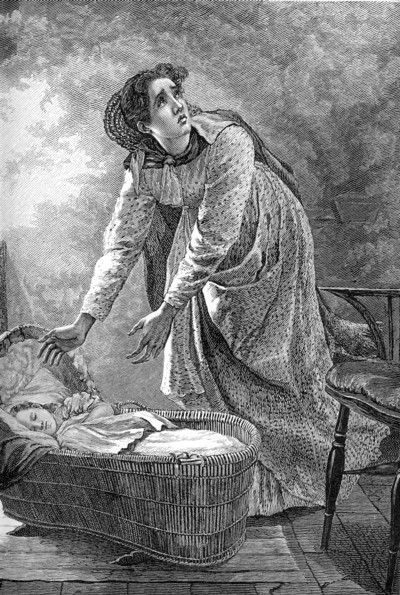
"And the mother flies where her baby lies."
|
TIMES OF REVEALING. |
|
THERE'S
a tramp of feet in the silent street,
A cry on the midnight air;
And men wake from sleep as the dread flames creep,
And strange steps are on the stair;
And the miser old grasps his store of gold,
The maiden her lover's scroll;
And the mother flies where her baby lies,
Though the flames around her roll.
And the loves men mean on their brows are seen
In that sudden, awful light,
All written plain out, without blot or doubt,
As they are in God's searching sight.
And does not life bring on its wondrous wing
To each soul some wild surprise,
When the lurking fact beneath thought and act
Walks out to our shrinking eyes?
And the shame or pride, which the truth would hide,
Are startled off from their post;
And what each holds best is made manifest,
Whether angel, fiend, or ghost.
T'is in such surprise that God's furnace tries
The dross that is in the gold;
And the loss or gain that in years have lain
In one hour is manifold.
And the only way to stand fast that day,
Is to tread firm, hour by hour
(T'is the winter snow, and the springtide glow,
That ripen the summer flower).
God's heroes must march through the lowly
Of duty, reared sure and strong;
Let us build to-day, and swift as we may,
For our trial shall come ere long.
I. F. M.
From The Quiver, 1880.
――――♦――――
|
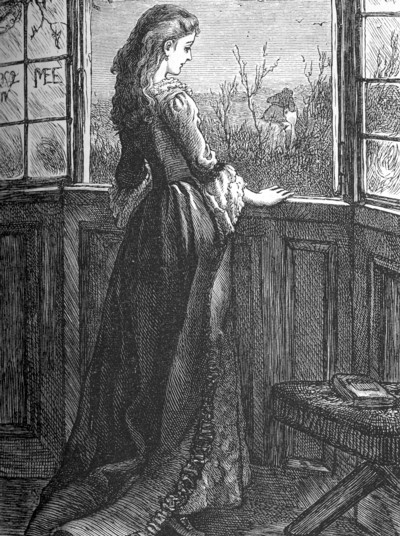
|
GOOD-BYE! |
|
GOOD-BYE,
good-bye!
And one goes out, and one stays standing still,
And that day's sun sink, o'er the low green hill.
Good-bye, good-bye!
And he goes on, far over field and moor,
And she turns back, goes in, and shuts the door.
Good-bye, good-bye!
She smiled upon him to the very last;
He'll never know what came when that was past.
Good-bye, good-bye!
And he who goes—he has but half the the pain,
His world is new, her empty rooms remain.
Good-bye, good-bye!
The books he opened, can she bear to close?
The rose he gathered; she will keep that rose!
Good-bye, good-bye!
And yet a day shall come when she shall say
"'T was well that he who loved me went away."
Good-bye, good-bye!
Love scarce is true until it has been tried;
And hearts can hold when hands are severed wide.
Good-bye, good-bye!
The last strong light of love in dying eyes
Pierces the mists of death that o'er them rise.
Good-bye, good-bye!
Nor Life nor Death has power to sever Love
It moves the world and builds the heaven above.
Good-bye, good-bye!
It ever has a sound of tears and sorrow;
Yet while we sleep, it changes to "Good-morrow."
I. F. M.
From The Quiver, 1880.
――――♦――――
|
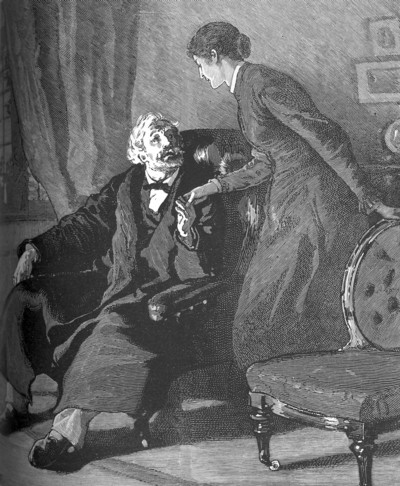
|
IN THE FIRELIGHT. |
|
COME and sit by
my side, my daughter, for memory stirs to-night
(How the wind on the wold is sighing, though our hearth is warm and
bright!),
And I feel sunk in a slumber, with the past for a vivid dream;
Less real than the lost and vanished, do the living and present
seem.
In the gloaming I see the spire that keeps guard where your mother
lies,
But the very ghost of her girlhood looks out in your wistful eyes—
And your brother is just such a lad as I was in years gone past:
Life is a dream, they say, daughter. But the morning
must come at last.
I am weary, you think, and wandering? I know I am frail
and weak,
And old folks are like little children: they cry when when they
cannot speak.
There's a new life beginning in both, with longings they cannot say;
But the mothers lull the babies, and death hushes the old away.
Are you weeping, my daughter? Nay, nay, what is there to
make you weep?
An angel, see, on the other side, is sharing the watch you keep:
And she does not grieve, daughter Mary. And yet, let
your tears have way,
For all save the bride and bridegroom are sad on the marriage-day.
I. F. M.
From The Quiver, 1880.
――――♦――――
|
|
A MESSENGER OF CONSOLATION. |
|
LOVE'S
peace is in her pure young heart,
Love's light is on her face,
She carries sunshine in her eyes
To many a shady place.
For aught she has of good and sweet
She only seeks to share;
She lends her loving strength to all
The crosses others bear.
Her posies cheer the sufferer's bed,
The city workshop's gloom,
She has a wreath to lay upon
The stranger's lonely tomb.
Through every gentle deed she does
Love's soft aroma steals,
The weary heart grows fresh again,
The wounded spirit heals.
And when she wanders through the woods
In morning's dewy hour,
Standing amid the flowers we see
Herself the fairest flower!
I. F. M.
From The Quiver, 1887.
――――♦――――
|
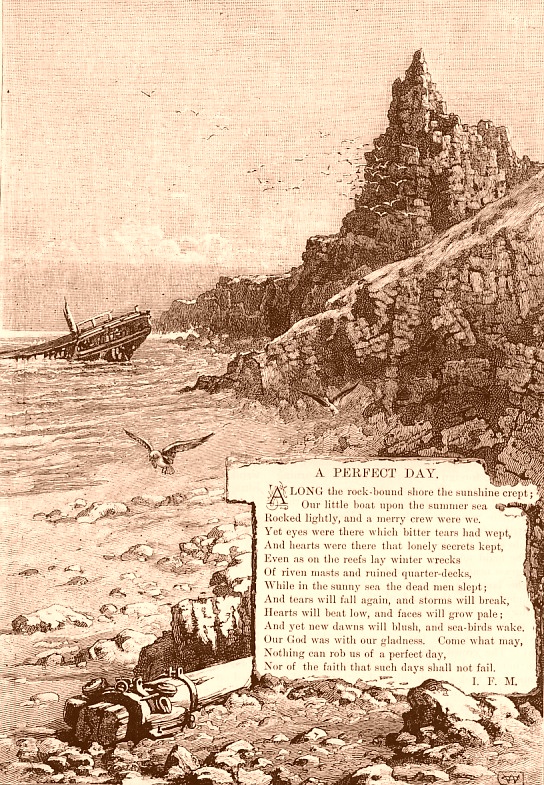
From The Quiver, December, 1886.
――――♦――――

|
SHADOWS OF THE PAST.
BY ISABELLA
FYVIE MAYO. |
|
I'M sitting in a
shady room,
A dainty scent pervades its gloom,
The perfume from a withered flower
Gathered—who knows in what sweet hour?
Or pressed by what fair lips which must
Have mingled long ere this with dust?
The relic of a grandsire's love
Stored with a letter and a glove!
And all about the room are spread
The handiworks of ladies dead:
A great aunt's miracles in lace,
A Dian coming from the chase
Worked by great-grandmothers of mine
While great-grandfathers sipped their wine;
And here's a valentine so torn
I think it was received in scorn.
And from the wall the pictured face
Of one, the glory of our race,
Looks down at me with earnest gaze,
As if he wondered at the ways
By which the old world rumbles on,
Though all he counted best is gone,
And that old fealty is dead
For which he bravely fought and bled.
And in yon ancient chest there hide
Charters of farms and acres wide,
Traces of what we once possessed.
Well, perchance poverty is best,
And we can still afford to keep
(Since harmless pride is always cheap)
Our boast that those lost lands were due
For packs of wolves our forbears slew.
And have they left no more behind,
These soldiers brave, those ladies kind?
Of beings vanished like a dream
How little do such relics seem!
And what of those who strayed and fell,
Records of sad defeat to swell?
Or those who only loved and prayed,
'Mid homely duties on them laid?
There seems a whisper in the air,
"We're there, and here, and everywhere!
Why need you wish that you had more
Of these poor shadows which you store,
When all the life in which you move
Is outgrowth of our life and love?
The very thoughts you call your own,
But flowers from seeds which we have sown!
"And none have left a stronger trace
Than some who lived in silent grace;
The maid who faded in her bloom
Brightened the pathway to the tomb,
With hopes from soul to soul which flow
Like streams whose sources none may know,
And he who perished at his post
Inspired the leader of a host!
"The dead are nearer than some say
(Stars shine on through the sunshine day!),
Nor must we chain the Present fast
About the ankles of the Past,
For both are living, and most move
In step to God's great march of Love.
We need not fear that any soul
Can leave but rose leaves in a bowl!"
The Girl's Own Paper, Part 81, Oct. 1886. |
――――♦――――
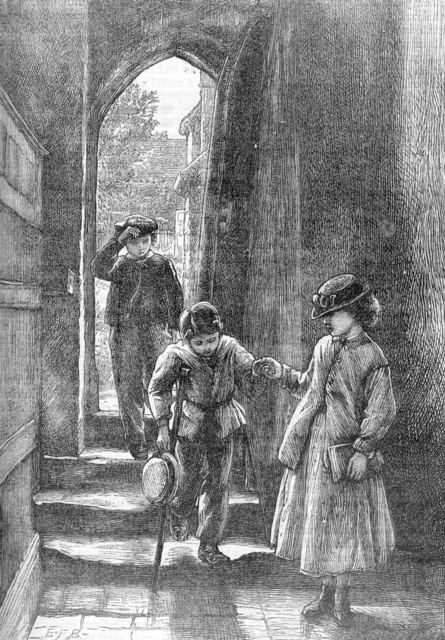
|
A CRIPPLE'S STORY. |
|
DO I not wish I
was like other folk?
Well, if a wish would do me any good
I think,—I almost think, sir,—that I should.
But if a lame limb's my appointed yoke,
It's not as bad as many a one might be,
It's easier p'raps to carry than to see!
I was not born here,—No, it must be hard
To be a poor lame child in such a place.
Why wonder at his pinched and wearied face,
When he's from God's own grass and trees debarred?
But just because I pity him, I guess
The God who made him does not pity less!
Lincoln's my place,—I hear they call it flat
The country thereabouts; but to my mind
It's just the sweetest spot you'll ever find:
But then the place one's born in's always that!
I know you'll smile, sir, but I often sit,
Hear parson talk of Heaven, and think of it!
They were as kind at home, as kind can be;
If father carried Kate or little Joe,
The rest would fret, and want a turn, you know,
But never minded how he carried me!
I've travelled over many a mile like that,
(God help the folks who call you country flat!)
If you've a trouble any one can see,
I think you'll always find them very kind:
It's when you go a-limping in your mind,
You get pushed over, or let coldly be.
Do I know aught of that? Well, sir, I do,
We cripples have our hearts, sir, just like you!
I could not play among the boys so strong,
But played among the girls! And there was one
Would leave her comrades to their dance or furl,
Beside my halting crutch to move along.
Lent me her books, and gave herself no rest
To find the flowers she knew I liked the best.
And at the old church steps she'd always wait,
To give a friendly hand to help me down,
Till prouder of my crutch than of a crown
I grew ! Out of such threads God weaves our fate.
And it went on—and I grew up with her,
And was bewitched to ask—you guess it, sir?
We two were walking in a long green lane:
"Why, Jem," she said, "I never thought you'd care,
You seemed so different to the rest, but there,—
Forget it ! Let us be ourselves again."
She pitied me, and yet with half a smile!—
I should have understood it all the while.
I was so foolish that I couldn't bear
The fields with all their dear old pollard trees;
There always seemed a voice upon the breeze
Saying, "Why, Jem, I never thought you'd care."
So now, the old folks dead, I came away,
And found this court—a change of scene, you'll say!
When I went back again, she was not there,—
I'd thought to find her wed, and wish her joy.—
But she was gone, sir, with a baby-boy!
And where she'd gone the people did not care;
They gave her bitter names and foul disgrace;
O, sir, I only saw the sweet good childish face!
I've never found her, sir; I've gone about
Over this city, when my work was done,
But, sir, they're many, and she's only one!—
And now, I think, that I must die without.
She's dead, I fear, in some black city sod;
I loved her sir, and so, I hope, did God!
I've help'd a few poor girls for her dear sake;
I do not fear their paint and evil tongue;
Somebody knew them, sir, when they were young;
They've told me stories fit your heart to break,
And if I'm kind to them, it helps my faith
God sent her comfort in a peaceful death.
I've had a hard life?—Did you say so, sir?
No, no! You see see, I often ponder thus:
The very Bible seems express for us;
Christ healed the lame, and spoke to girls like her.
No, sir, I think my sort of life's the best,—
Just makes one tired enough to like one's rest.
It's sixty years I've hobbled on my way,
She must be dead, and I—I can't last long.
I'll know her voice in all the burst of song
When Heaven's gate opens. If she's there, d'ye say?
We mustn't judge our foes, says God above,—
Surely some ground of hope for those we love!
ISABELLA FYVIE.
From The Sunday Magazine, 1869. |
――――♦――――
|
